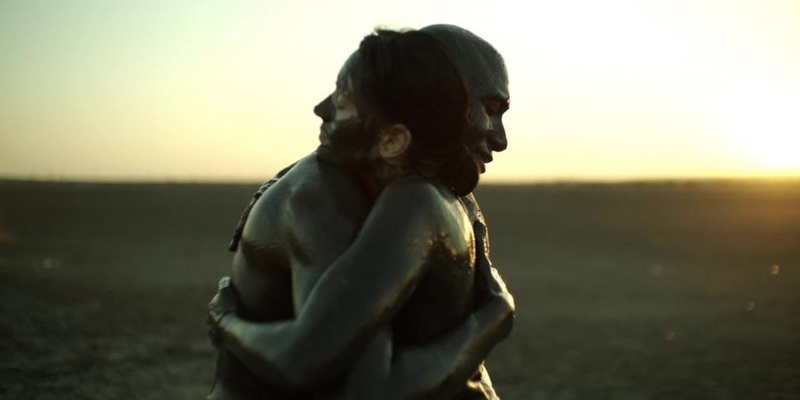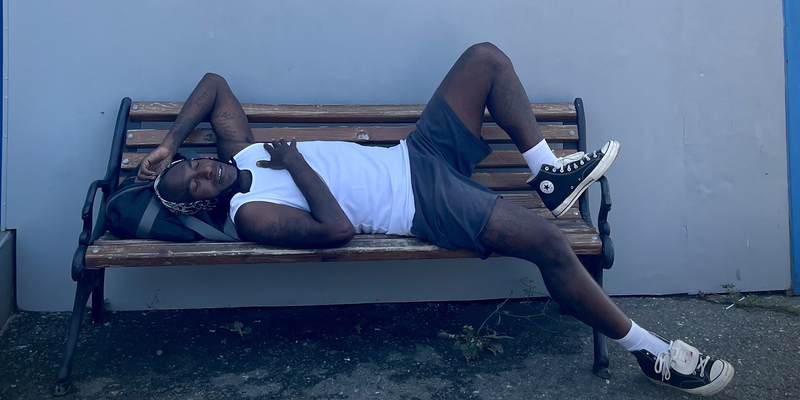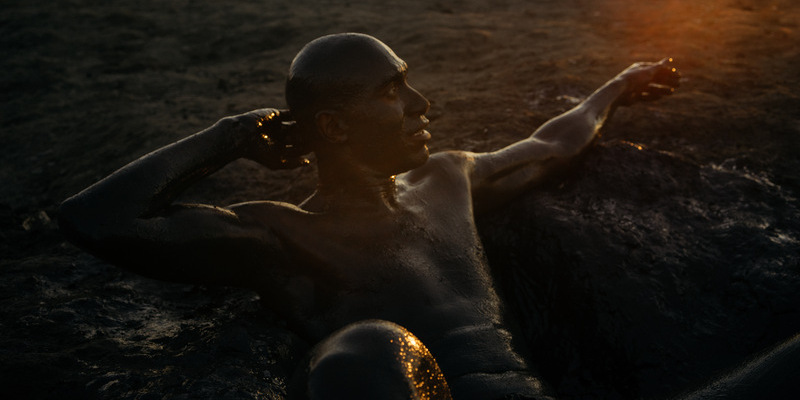
Review by
Eric Hillis
Directed by: Derrick B. Harden, Crystal Moselle
Starring: Derrick B. Harden, Irmena Chichikova, Stoyo Mirkov, Samuel Finzi
Crystal Moselle and Derrick B. Harden's
The Black Sea is something of a cousin of Valeska
Grisebach's acclaimed 2018 film
Western, in that it's about a foreigner who finds unlikely kinship in small
town Bulgaria. Moselle and Harden opt for a much looser storytelling
structure however, and the result is a film that feels like we're
hanging out with friends and affable strangers in a sunny locale for 90
minutes.
Along with co-directing, musician/rapper Harden plays the lead role of
Khalid, who quits his job as a Brooklyn barista and flies to the
Bulgarian coastal town of Sozopol, where an elderly woman has promised
him a cash sum in exchange for what he mistakes as sexual favours.
Unlike the viewer, Khalid is unaware of the film's prologue, in which
the woman is told by a fortune teller that she is terminally ill and can
only be healed by the touch of a black man. With no black men to be
found in Sozopol, the woman puts a presumably poorly worded ad on
Facebook, but when Khalid arrives she has just passed away, leaving him
out of pocket.

After spending the night sleeping in a docked boat, Khalid awakes to
find his bag and passport have been stolen. Wandering back into the
centre of town he comes across Ina (Irmena Chichikova), who runs
a makeshift travel agency from a hole in the wall. Without a passport
she can't help Khalid get home, but she puts him in touch with the local
big man in town, Georgi (Stoyo Mirkov), who sets him up with an
exploitative job cleaning boats for a payday that keeps being put
off.
Khalid also finds that he's expected to act as a gigolo, entertaining
the elderly female tourists who party on Georgi's boats. Khalid storms
off and is taken in by Ina, who allows him to sleep on a mattress in the
back of her makeshift office. Introduced to the local delicacy of
"prinzesi" (essentially cheese on toast), Khalid is reminded of the
hardship of a youth spent eating grilled cheese sandwiches. Displaying a
knack for making the toast, along with cups of "matcha" tea, Khalid
opens a café outside Ina's office. His enterprise becomes an instant hit
with locals and tourists alike, as do the open mic nights he hosts. This
makes him an enemy of Georgi, who owns Ina's property, and seems to
believe he has similar proprietorship over Ina herself.

The Black Sea requires a certain degree of suspension of
disbelief regarding its initial setup. The idea that a woman seeking a
black man anywhere in modern Europe would have to reach out to America
is patently ridiculous, especially in a coastal Balkan town with its mix
of tourists and migrants. But Khalid stands out from the African black
men you might find in an Eastern European coastal town, in that he's
distinctly American. Khalid's larger than life persona and
entrepreneurial spirit could only be the product of the New World.
Dismissed at home as a layabout, Khalid displays an American work ethic
that knocks the lackadaisical Bulgarian natives for six. As Khalid
rushes around in his new role of a man of business, Ina looks positively
drained by his presence. "You did all this in three weeks?" a bemused
local asks Khalid upon observing the business he's built so
rapidly.
The Black Sea explores the odd irony of how we so often
feel more relaxed in foreign surrounds. With strangers we can reinvent
ourselves and expand our possibilities. Make a mistake at home and it
can define you for the rest of your life, but on foreign soil where
nobody knows your backstory you can make a fresh start. "Back home I
could never open a café because they're all run by foreigners," Khalid
notes, "Now I'm a foreigner and I'm running a café."
Aside from a basic narrative, most of The Black Sea is
improvised, with Harden and Moselle capturing genuine reactions to the
former from the people he meets on the street. Unlike the misanthropic
work of Sacha Baron Cohen, there's never a sense that Harden and Moselle
are hoping to entrap unsuspecting Bulgarians into displaying racist
behaviour on camera. Everyone Harden meets treats him like a brother in
the familial rather than racial sense, and the worst we hear from the
locals' lips are ignorant but well-intended comparisons to rappers and
basketball players. As he did in his real life trips to Bulgaria, Harden
discovers the Bulgarians have a love of hip hop music, which only
endears him further to their sensibilities.

The Black Sea also highlights how sometimes it takes
foreign eyes to point out how good we have it. Wandering around Sozopol,
Harden is constantly taken aback by the natural and historical wonders
he happens across, which are dismissed by Ina, who takes her surrounds
for granted.
Harden and Chichikova make for an endearing odd couple, and the
improvisational nature of the film allows for some great natural comedy
as they mutually react to encountering cultural differences in real
time. Their relationship is refreshingly platonic, though there is a
sense that it could develop into something else beyond the end credits.
Hanging out with this brash American and stoic Bulgarian is an easygoing
joy, and like the best trips abroad, you'll be disappointed when the
credits roll and it's time to go home.


